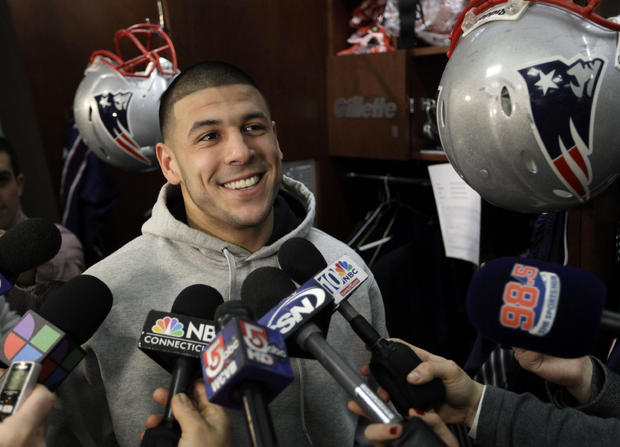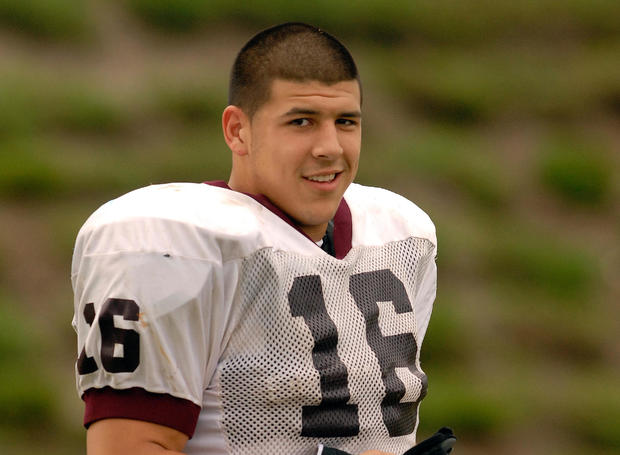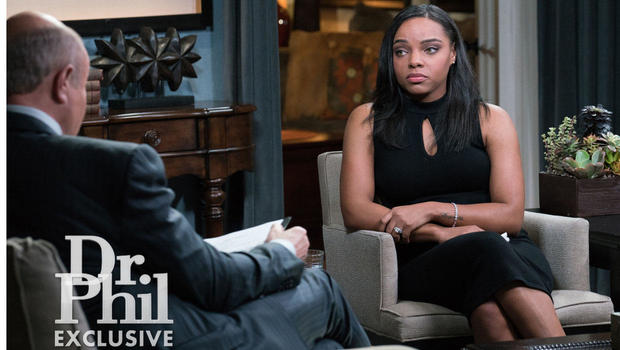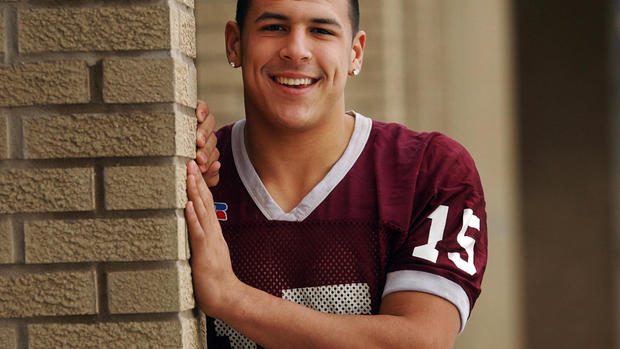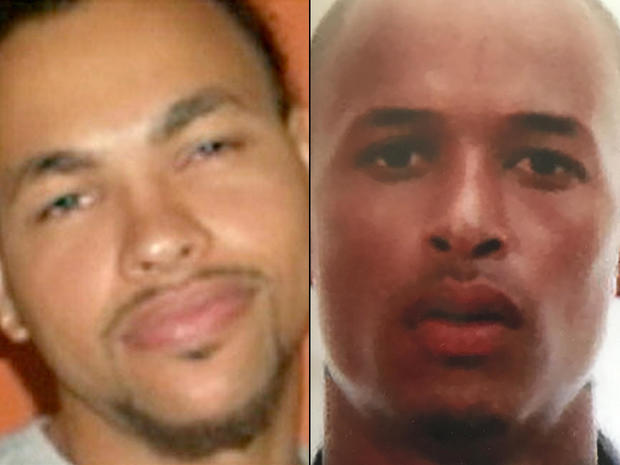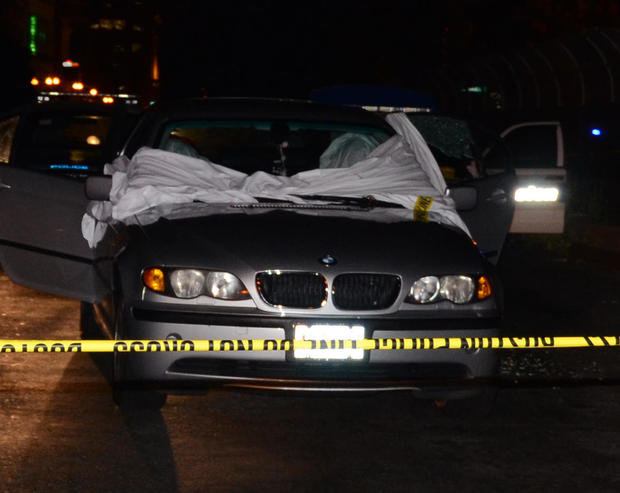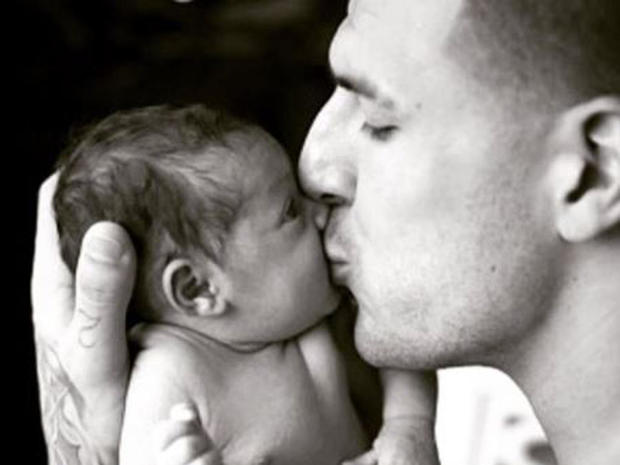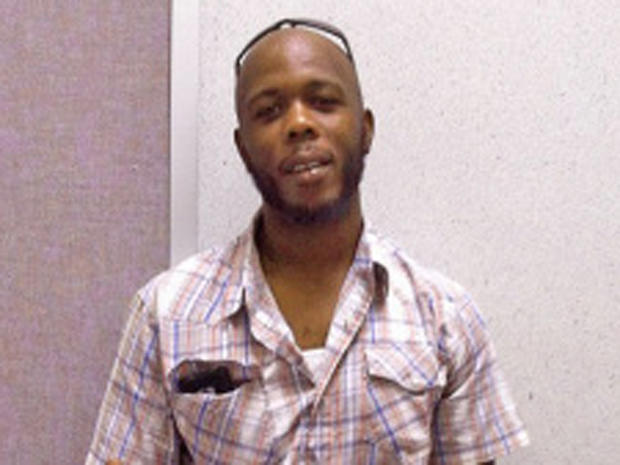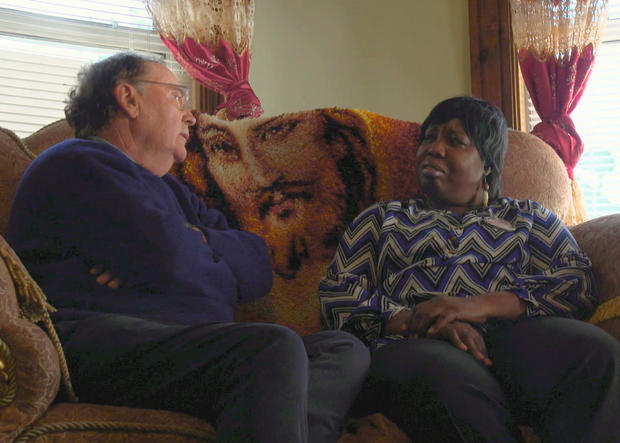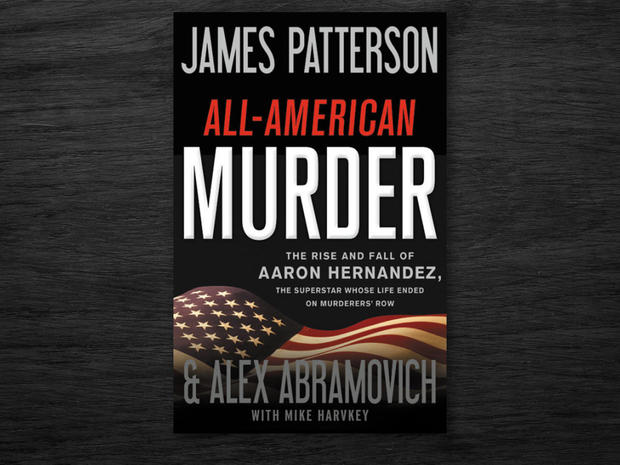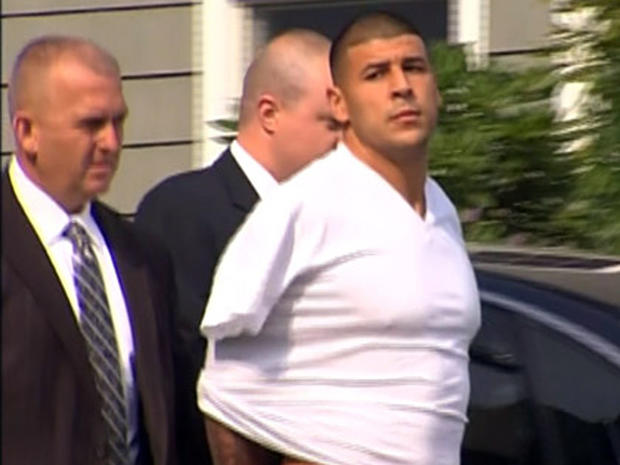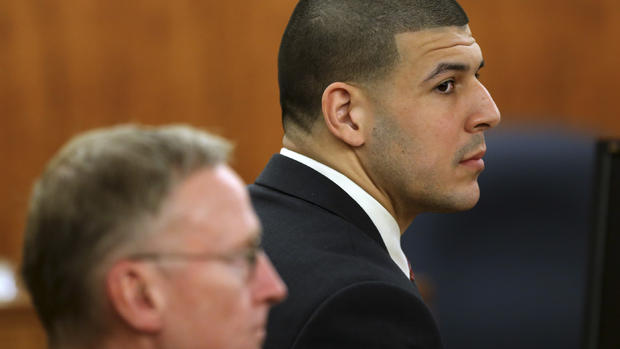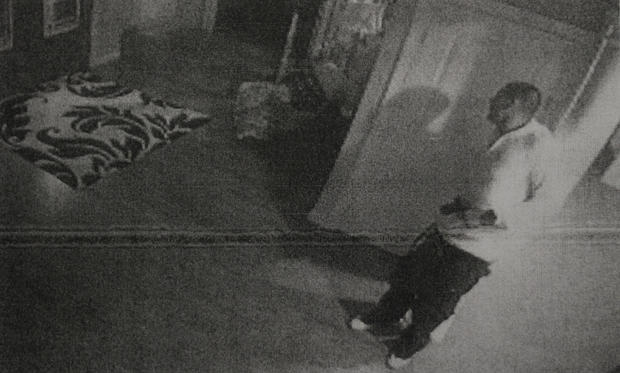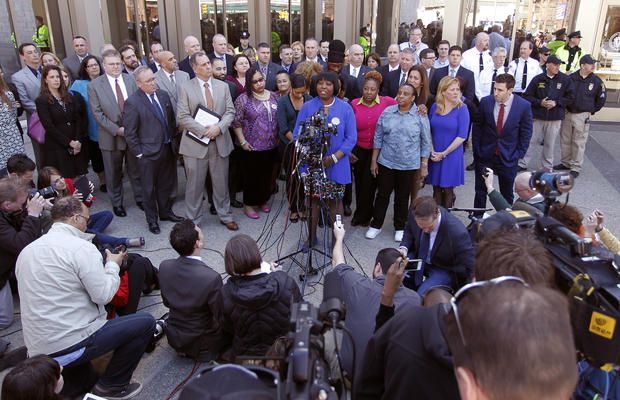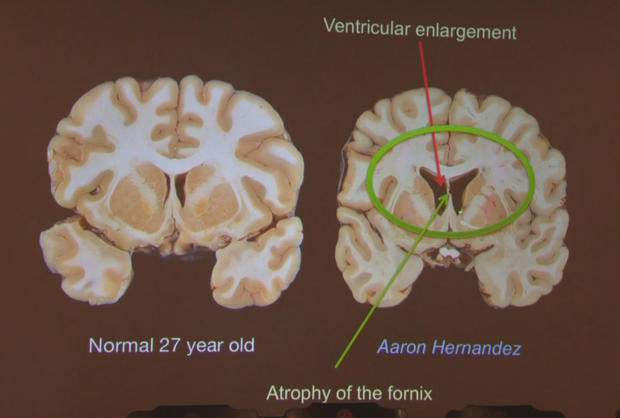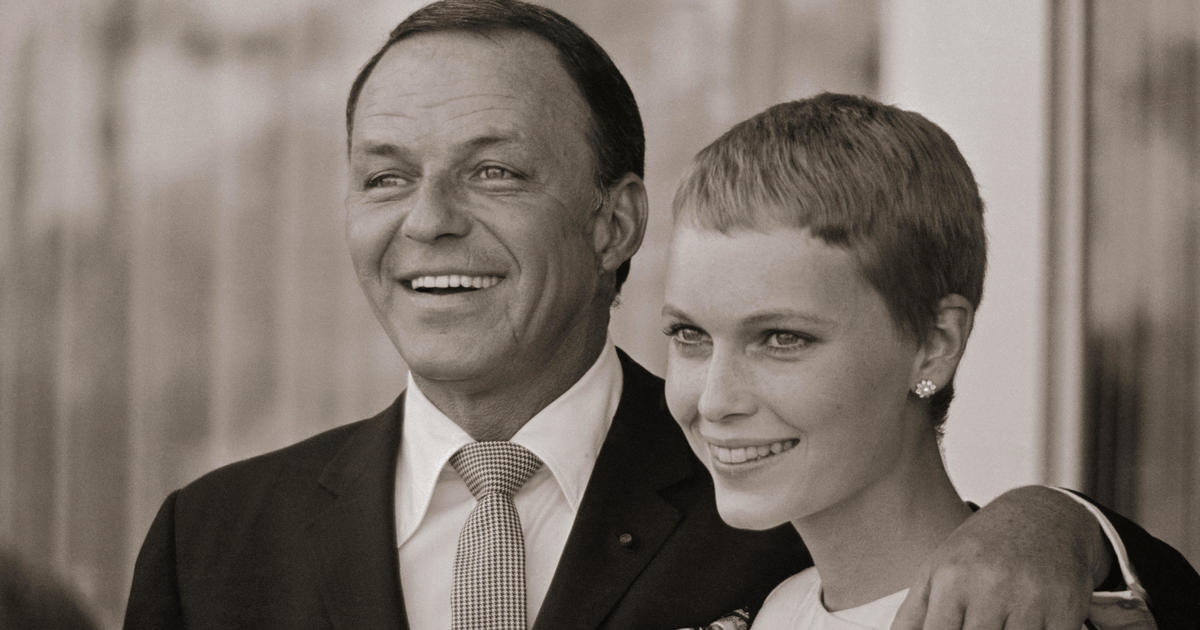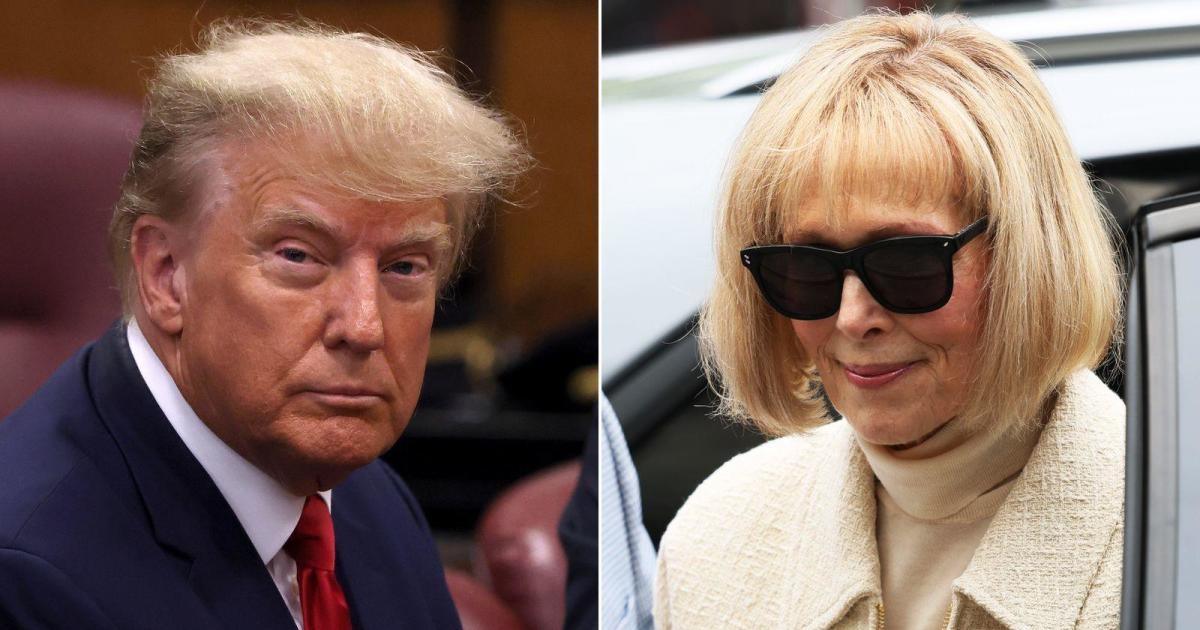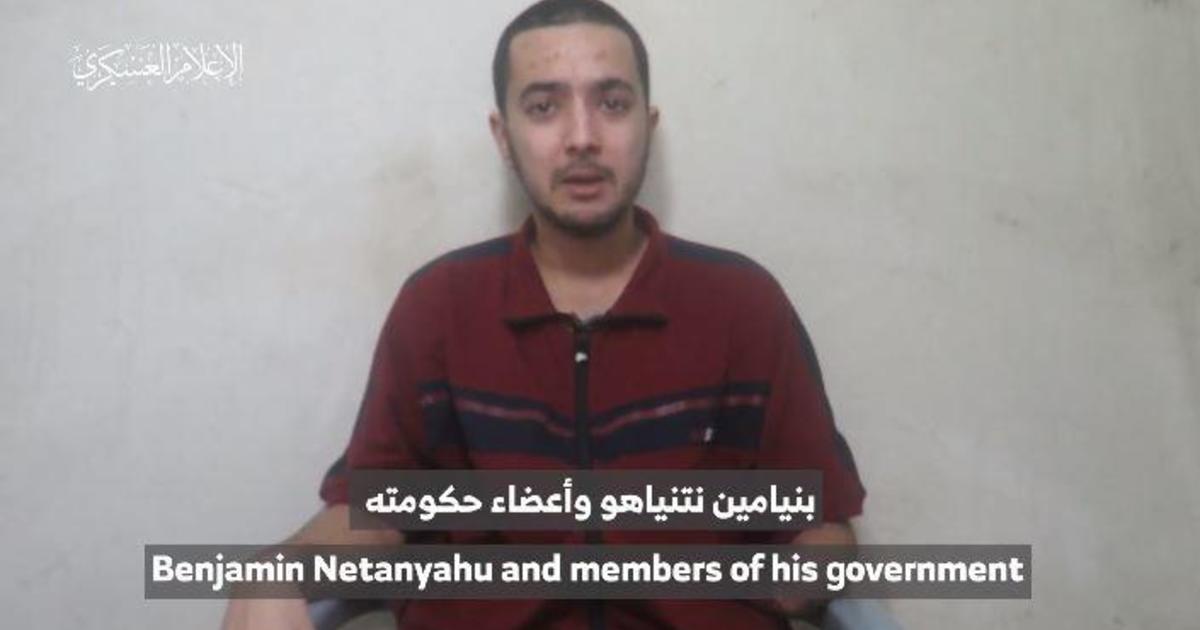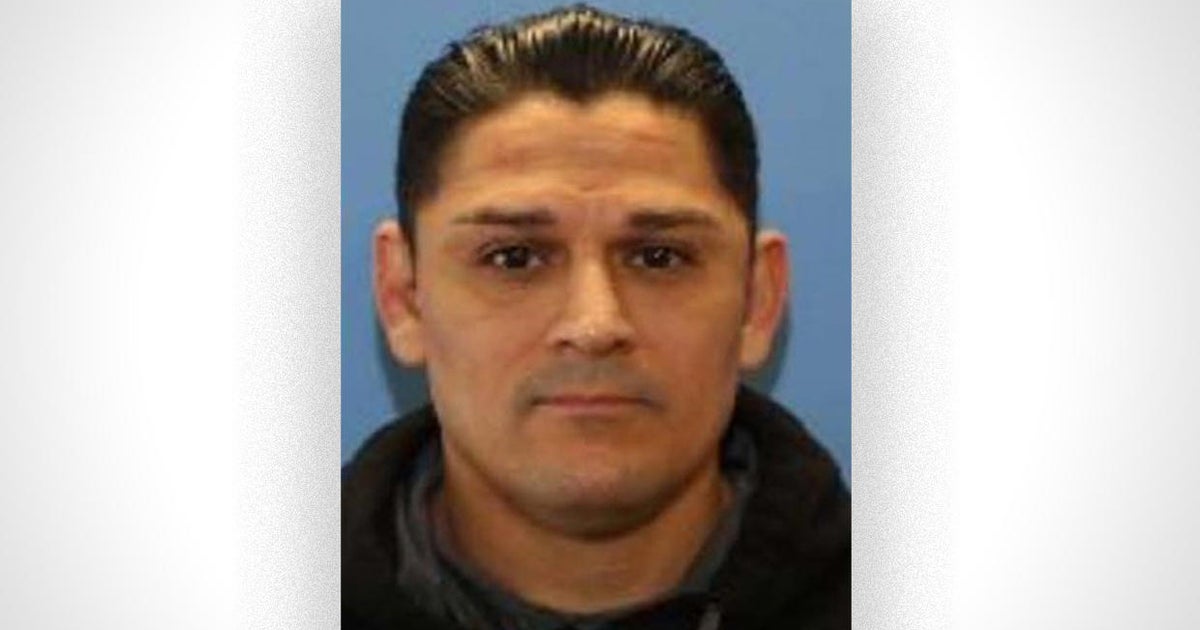All-American Murder: The Rise and Fall of Aaron Hernandez
Produced by Jaime Stolz
Aaron Hernandez seemed to have it all. He turned a hardscrabble childhood into superstar NFL dreams. In 2012 he was on one of the all-time best teams in the NFL and was armed with a new $40 million contract extension. But then it all fell apart when he was arrested for the 2013 murder of semi-pro linebacker Odin Lloyd in North Attleboro, Massachusetts. He was convicted of murdering Lloyd in 2015 and in April 2017, Hernandez committed suicide in a Massachusetts prison where he was serving a life sentence. He was 27.
"I believe this is the most fascinating, complicated and troubling crime story of our times," says best-selling author and "48 Hours" contributor James Patterson."And you don't know the half of it yet."
Patterson and "48 Hours" explore Hernandez' life, as a child growing up in Bristol, Connecticut, where football glory got him into college and then to the NFL. But, despite the on-field accolades, as Patterson reports, he could never outrun his history, including the impact the death of his father had on him, and his other personal demons, which remained hidden behind the mask of a celebrity football player. In addition to being charged and convicted of killing Lloyd, Hernandez was also charged and acquitted of killing two others.
"You hear stories about the fall from grace," says Urban Meyer, who coached Hernandez at the University of Florida. "And this might be one of the most tragic of all time."
Off the field, Hernandez hung out with a bad crowd and used drugs, police say. After his death, doctors learned, the countless hits he took playing football may have caused Chronic Traumatic Encephalopathy, better known as CTE, a degenerative brain disease found in people who have suffered repeated trauma to the head. The illness can't be identified until the person has died. In November 2017, researchers at Boston University revealed that Hernandez had the most severe case of CTE they'd ever found in a brain of someone his age, which, they said at the time, would have impacted his decision-making, inhibition of controlling aggression, emotional volatility and rage behaviors.
"He wasn't an evil man. No he wasn't. He was a sick man," Dr. Bennet Omalu, the first to identify CTE in football players says of Hernandez.
Ever since the former gridiron great hung himself with a bedsheet, Patterson has been reporting on Hernandez' story for a new book, "All-American Murder," due out Jan. 22, 2018, from Little Brown and Company.
Hernandez's death, Patterson says, didn't end the story; in fact, it "opens up a whole new arena of conflicts and questions."
THE BOY FROM BRISTOL
Bristol, Connecticut, is a working-class town -- football country. It was November 2006, and all eyes were on Aaron Hernandez.
Shawn Courchesne | Former sports reporter, Hartford Courant: It was amazing to watch.
Tim Washington | Hernandez family friend: We played right on this field back here. Muzzy Field. … It was just unbelievable to see the skills that he had.
James Patterson: He has the moves of a basketball player … he's very shifty. He dances. His footwork is amazing.
Shawn Courchesne: …everything just stood out that, "Wow, this kid is really, really good."
Ian Rapoport | NFL Network: He was the best player in the state of Connecticut. He was probably the best player in the whole Northeast.
Aaron Hernandez [high school interview]: We don't want a tie. We want to win the games.
The formation of Aaron's mask began at home, in a small cottage on Greystone Avenue in Bristol.
Tim Washington: Small town. Everyone knows everyone here.
Growing up Aaron shared a bedroom with his brother, D.J., who was three years his senior.
Tim Washington: D.J.'s dad was a former coach of mine … That's how I was introduced to the Hernandez family, you know through Dennis.
Aaron's parents, Dennis and Teri, were determined to keep the boys on the straight and narrow.
Aaron and D.J. worshiped their father.
Aaron Hernandez interview: He loved kids, he loved helping anyone he could.
Shawn Courchesne: Aaron's father had played at the University of Connecticut.
Tim Washington: He was a really good guy … Kind thoughtful, loud, funny, charismatic.
"If you do anything great in life it will come from within," Dennis would tell them. "And if it is to be, it is up to me."
Tim Washington: Off the field Aaron was just charismatic, loving.
James Patterson: A young woman by the name of Shayanna Jenkins was Aaron's high school sweetheart. She shared their love story with "Dr. Phil."
Shayanna Jenkins-Hernandez | | Aaron Hernandez's fiancée: He would say it was middle school. I say it's more towards high school … It was high school love, high school sweethearts.
Attorney Linda Kenney Baden: She loved Aaron Hernandez when Aaron Hernandez had nothing.
Shayanna Jenkins-Hernandez [to "Dr. Phil"]: He was full of life. So sweet. Very lovable. Would do anything for anyone.
Then tragedy struck.
James Patterson: When Aaron was 16, his father went in for a hernia operation, and died very unexpectedly.
The largest funeral parlor in Bristol was too small to host the thousand-plus people who turned out for the man who was known around town as "the king."
Ian Rapoport: His father passing away was one of the most important and damaging moments of his life, because it was when he went the other way.
He picked up new running mates: a drug-addled townie named Carlos Ortiz and an older man named Ernest Wallace.
Tim Washington: Those are people that we grew up with. They may not be the best people to hang out with.
James Patterson: But I don't think his father would've let that happen.
Shawn Courchesne: In February 2006 … every major college football program in the country was trying to contact him.
It was a lot of pressure for a teenager. Hernandez opened up about it all with a local TV station.
Aaron Hernandez [WTNH interview]: Half of my family telling me to go to Notre Dame, Michigan, Miami.
Shawn Courchesne: D.J. was already playing at the University of Connecticut.
Aaron Hernandez [WTNH interview]: It's like, what do I do?
Then, the Florida Gators made their full-court press.
James Patterson: And Aaron went down to the University of Florida and went, "Wow."
James Patterson: Great coach, Urban Meyer.
Urban Meyer | Former Head Coach, University of Florida: I remember watching the videotape … I'm not sure you'll ever see another guy that can do what he can do.
James Patterson: When Aaron went down … to the University of Florida, Urban Meyer really watched over him.
Ian Rapoport: Urban Meyer … Definitely has a soft spot for people who do not walk the straight line.
Urban Meyer: There was times where he would, I mean, it was a meltdown in my office … sobbing about his dad and how much he missed him it happened so fast he never had a chance to say goodbye, those type of things.
Urban Meyer: I would have my daily routine when I come in the mornin'. And I'd read the Bible. …And he'd say, "Can I come and do that with you in the mornings" and I said "absolutely."
Ian Rapoport: Does not surprise me one bit. Aaron Hernandez was a chameleon. Whatever audience he was with, that's sort of what he became.
Deonte Thompson | Buffalo Bills wide receiver, former college teammate: Me and Aaron was good friends. … Just a beast. He's a guy you want in your foxhole. Play hard, play with his heart.
Urban Meyer: He's one of the best players in America. Get him the ball. He was ridiculous.
Blows sustained on the football field were already altering the structure of Aaron's still-developing brain.
Dr. Bennet Omalu | Forensic Pathologist, University of California, Davis: If a child plays football for just one season … that child's brain suffers brain damage.
Dr. Bennet Omalu: CTE stands for chronic traumatic encephalopathy.
Dr. Bennet Omalu discovered CTE and was the first to identify it in football players. It is a degenerative brain disease linked to repeated blows to the head.
Dr. Bennet Omalu: There is no safe blow to the head.
James Patterson: People get hit in the head a lot. It doesn't seem to turn out very well for an awful lot of people.
Linda Kenney Baden: The greater he was at his job the more damage that he sustained.
Up in Bristol, he'd kept up his friendship with Carlos Ortiz and Ernest Wallace.
Urban Meyer: When he would go home, when he would have friends from home come visit him… I would notice a difference in him.
Linda Kenney Baden: Aaron … didn't have much of a support system once his father died.
James Patterson: From everything we can tell he was certainly a serial weed smoker. PCP.
Urban Meyer: I'd hear stories about marijuana. We would test him frequently and he only had two positive tests. He was suspended for a game.
James Patterson: They certainly made allowances for him.
Urban Meyer: No, no, no … Counseling … firm discipline.
James Patterson: An ugly off campus incident provided a glimpse of the demons that lurked behind the mask.
James Patterson: He was in a big bar fight. Kinda coldcocked a bartender.
Urban Meyer: Never really heard about the bar fight.
Deonte Thompson: We all had fights, I mean we was still kids. …Things happen when you're a kid drinkin'. Things happen.
Urban Meyer: Three or four players were wanted to be questioned about being a witness to a shooting in downtown Gainesville. …There never was a time when they said he was a suspect.
Ian Rapoport: Is it looking the other way or did he fool everyone?
Urban Meyer: No never looked the other way.
Ian Rapoport: He was as good of a player as you could imagine.
Tim Washington: Sooner or later he was off to the NFL.
The NFL scouts knew he was a freak of nature. They didn't know what he was like as a person.
Ian Rapoport: He had issues.
James Patterson: There have been a lot of stories that circulated through the NFL that this kid could be trouble.
Aaron had to wait until the last day of the draft to hear his own name called. The New England Patriots had taken him as the 113th choice of the draft.
Aaron Hernandez interview: Draft day was definitely long, way longer than I expected.
James Patterson: When the Patriots drafted him they talked to Urban Meyer and Urban said … "you have to stay on top of him."
Ian Rapoport: When you get him in the building, he's great. When he leaves the building, you cross your fingers. When he goes to Bristol, you pray.
A SECRET LIFE
When Aaron Hernandez got to Foxboro, the team Patriots head coach Bill Belichick had built was at the top of the NFL.
James Patterson: He was a model football player. He was a hard worker. … He wanted to be great.
Brian Murphy: Aaron Hernandez's personality was electric.
Ian Rapoport: First thing I think of is the touchdown dances. …Open the safe. Door open. Grab the money. [Claps hands] Make it rain.
Tim Washington: I just had to be in front of the TV when the game started … and just how proud his dad would be.
The boy from Bristol found himself in Indianapolis, playing in his first – and only – Super Bowl.
Urban Meyer: Here's a guy that went through that tough stretch of losing his father and it seemed like everything was in order.
James Patterson: He had a secret life. And I don't think the people and the Patriots knew about it.
Interviewer: Tell me about the tattoos.
Aaron Hernandez: It's a quote my father always used to give me, and it says, "If it is to be it is up to me" … So the life I wanna live is all in my hands.
Interviewer: Are you living the life you wanna live?
Aaron Hernandez: Umm, as of right now, yeah.
Ian Rapoport: Aaron was always around his locker. We were friendly. We exchanged numbers and he was like,"You're my guy. If you ever need anything, you let me know. But if you ever f--- me over, I'll kill you." And I was like, "OK," and I kinda laughed a little bit.
Urban Meyer: I'm very close with Coach Belichick. …My whole thing was, "Make sure he's around good people."
Ian Rapoport: That was a major concern for the Patriots, too … When he was in New England, Bristol was close.
There were old friends like Carlos Ortiz to hang out with. And there were new friends, like Alexander Bradley.
Linda Kenney Baden: Alexander Bradley owned a lot of guns.
Shayanna Jenkins-Hernandez [to "Dr. Phil"]: He didn't have the best choice in some friends. But that doesn't make him a bad person.
But Alexander Bradley and Aaron Hernandez got along well.
Ian Rapoport: He'd leave the facility, and he'd morph into something else based on the people he was hanging out with.
The kid from Bristol was a superstar now. He loved the limelight, the action, the nightlife. One of his favorite haunts in Boston was the pulsing dance floor of Cure nightclub.
On July 15, 2012, Bradley and Hernandez set out for Cure in silver SUV with Rhode Island plates. Just ahead of them, two total strangers, Daniel de Abreu and Safiro Furtado, were paying the entrance fee.
The dance floor was packed when de Abreu bumped into Hernandez.
James Patterson: Spilled a drink on Aaron Hernandez, Aaron goes ballistic … Alexander Bradley gets Aaron out of the club.
James Patterson: So you guys were working at a club in this area? So what happened that night?
Don Gobin | Witness: We came out of the club that we worked at … And we got into our car.
Brian Quon | Witness: A silver SUV came out of nowhere. … went right through the red light.
James Patterson: At the time, you didn't recognize who it was.
Don Gobin: Did not.
James Patterson: And you see the two cars side-by-side.
Don Gobin: Yeah. Yeah.
Don Gobin: And all of a sudden we heard gun shots. …We saw two people in the front … had been shot; it was a lot of blood.
It was Safiro Furtado and Daniel de Abreu -- two friends who had just gone out dancing. Both died after midnight on a Boston Street.
The police made no progress in the weeks that followed. But Aaron sure did.
Ian Rapoport: They signed him to a $40 million dollar extension. … life-changing money.
Aaron Hernandez: This is probably one of the best days of my life and I just hope I keep … making the right decisions … and be there to live a good life with my family.
Shayanna Jenkins-Hernandez [to "Dr. Phil"]: A huge accomplishment of course. But I don't think anything changed for us we just had more money in the bank in a sense.
Aaron Hernandez: And all I could do is play my heart out for them … and live like a Patriot.
Aaron and Shayanna got engaged that October. A few weeks later, they celebrated the birth of their daughter, Avielle Janelle.
Aaron Hernandez interview: Definitely a life changer. Especially every time I come to the stadium, can't wait to go see her.
Shayanna Jenkins-Hernandez [to "Dr. Phil"]: He's just to me a great guy. He's the love of my life—the father of my child.
Brian Murphy: I mean that's the tragedy in all of this is that it could've been a fairy tale.
But in fairy tales, the hero doesn't shoot at strangers … doesn't blow away his pals.
James Patterson: Hernandez was definitely capable of shooting his friends.
It was February 2013 -- more than six months after the still unsolved murders of de Abreu and Furtado. Hernandez and Bradley headed south to party. They hit the Miami strip club, "Tootsies."
Detective Kenny Smith | Palm Beach County Sheriff's Office: Aaron Hernandez went through $15,000 cash. Apparently, on the way back from Tootsie's up in Palm Beach County, Aaron Hernandez expected Mr. Bradley to pay half of it. Mr. Bradley didn't have any money.
Bradley and Hernandez left Tootsie's and headed north.
Det. Kenny Smith [at crime scene]: Mr. Bradley was asleep in the car when all of a sudden he woke up right around this area. And when he did he was looking down the barrel of a gun.
The bullet tore through Bradley's hand, blowing off part of one finger, passed through the bridge of his nose, and exploded his right eye in its socket.
Det. Kenny Smith: This is where we found him, right in this area.
James Patterson: And the police ask Bradley who did it. He won't tell 'em.
Kenny Smith: He did not want to assist with the investigation, didn't want to cooperate. …Our case becomes cold at that point
James Patterson: But he's in contact then with Aaron.
Aaron was receiving a steady barrage of text messages from Alexander Bradley. The two men went back and forth, mixing threats with endearments:
"u did that bull---- for no reason n me being the real friend I was to u I didn't try to ruin u even after u tried to kill me"
"I MISS U AND LOVE YOU and still watch videos of us having fun every single day and can't believe this…"
James Patterson: You read [the texts] and you go, like, "what's going on here?"
Whatever went down between Bradley and Hernandez … whatever happened on that bloody Boston street, both cases remained cold, a ragged jigsaw of evidence. Hernandez stayed in the spotlight as a New England Patriot. And by spring 2013, Hernandez was hanging out with a new friend -- Odin Lloyd, a semi-pro football player.
Attorney Doug Sheff: He was a decent, hard-working good kid. He took care of his family to the highest extent that a loving son could.
Ursula Ward: He's a silly kid, he'll just make you smile.
THE MURDER OF ODIN LLOYD
Odin Lloyd grew up in the gritty neighborhood of Dorchester. He worked hard, never had a lot of money, but he did have at least one thing in common with Aaron Hernandez---football.
Mike Branch | Odin Lloyd's former coach: My relationship to Odin -- football coach. I would say mentor, friend.
James Patterson: Odin did not have the money for college.
He played for a semi-pro team, the Boston Bandits.
Mike Branch: These guys are not paid … You know, he rode his bike to practice. That shows you commitment.
James Patterson: Probably the most amazing person in this whole story … was Ursula Ward, who was Odin Lloyd's mother.
James Patterson: Let's shoot the breeze. Tell me about Odin.
Ursula Ward: He would turn a bad situation into a good one.
James Patterson: Tell me some other things about him.
Ursula Ward: He's a down-to-earth person. Never take anything for granted.
James Patterson: So Shaneah was his first girl that you were going, like, "OK, this is a good idea."
Ursula Ward: Shaneah was the one.
Shaneah Jenkins was the sister of Shayanna, Aaron Hernandez's fiancée.
Doug Sheff: Aaron Hernandez and Odin Lloyd simply dated sisters.
James Patterson: And clearly you get the chance to hang out with Aaron Hernandez and you love football and you love the Patriots, so that's a pretty cool thing, right?
James Patterson: The last time you saw Odin was what Father's Day, right?
Ursula Ward: Yeah.
James Patterson: And he wished you a happy Father's Day, 'cause you had been a good father and mother to him, right?
Ursula Ward: He sure did. …And he says "Ma, you look so beautiful today. I love those colors on you." Who would've thought that those were the last words that I would've ever heard from my son.
It was the night of June 16, 2013. Hernandez texted down to Bristol to Carlos Ortiz and Ernest Wallace. Soon, the three headed for Dorchester to pick up Odin Lloyd. One of Odin's sisters saw them pull up. A half hour later, she began getting a series of texts from Odin:
"U saw who I'm with 'Nfl' Just so you know"
After that there were no more messages.
Matthew Kent ran track and played football at a high school in Attleboro, Massachusetts.
Matthew Kent: I was running home from the gym down the road. …I came over the hill and saw someone lying on the ground. … He looked like he was dead.
News report: Tonight police in North Attleboro are investigating the discovery of a body…
Captain Joseph DiRenzo | North Attleboro Police Dept.: There were .45 rounds around the body. No gun. So at that point I knew we had what looked like a homicide.
James Patterson [to investigators]: You're gonna go into the victim's pockets. And what do you find there?
Lieutenant Michael King | Massachusetts State Police: We find car keys to Enterprise Rent-A-Car. …Then when we find out the car was rented to Aaron Hernandez.
James Patterson: OK. And what's your reaction to that?
Capt. Joseph DiRenzo: "That Aaron Hernandez? Which Aaron Hernandez is this?"
Lt. Michael King: It can't possibly be him.
James Patterson: Car keys in the pockets. The car is a rent-a-car in Aaron's name.
James Patterson: Less than a mile from his house. This is crazy. …If I wrote something like this in one of my books, you'd go, "Patterson's lost it, cause this thing could never happen." But it happened.
James Patterson [to Ursula Ward]: You get a call from the police.
Ursula Ward: He says, "Do you know Odin Lloyd?" I said "Yes". And he says, "Ma'am, I'm gonna send two detectives to your home."
Ursula Ward: And -- I remember one of them says … "I'm sorry, ma'am, but your son was shot and killed." …I fell to the ground. I said, "That's my son."
Ursula Ward: [Emotional] I don't remember nothing else after. … And then my daughter Shaquilla said, "Wait a minute, my brother was texting me."
Ursula Ward: She gave the police her phone.
The same phone Odin had texted to about just who had picked him up that night: "Nfl."
Lt. Michael King: So they went to the house. They're knockin' on the door. …But no one comes to the door.
Brian Murphy | Hernandez's sports agent: He called me and said, "Hey Murph -- there's a policeman outside my door and I'm not sure why he's here." And I said, "Well just go ask him."
Lt. Michael King: And eventually Aaron opens the door. So they go back and forth a little bit and ultimately Aaron says to them, "What's with all the questions?"
"We're investigating a death" the detective said.
Capt. Joseph DiRenzo: And he just slams the door when he finds out it's a death investigation. He doesn't say, "Whose death? How's Odin? Is Odin OK?"
Lt. Michael King: We go … to the Enterprise Rent-A-Car … Speak to one on the people there… And she says, "Hey I don't know if this is important, but I found a bullet."
It was the sort of break detectives lived for. The shell casing looked exactly like ones the detectives had found at the scene of Odin Lloyd's murder.
Ian Rapoport: And the news breaks … that he is a person of interest. I'm talkin' to some of the editors and they're like, "Can you believe this? Like Hernandez?" I so vividly remember thinking, "I could see that."
Urban Meyer: …what he was being accused of, it was -- just take[s] your breath away. … You know, how -- how did this happen?
Shayanna Jenkins-Hernandez [to "Dr. Phil"]: He may have been at the wrong place at the wrong time. But I don't think he, you know, what is said to be out there is actually accurate.
Ian Rapoport: We're goin' wall-to-wall coverage at that point. The helicopters are following his car.
As the investigation went into overdrive, the spotlight was on Aaron Hernandez -- but in a whole new way.
Reporter to Hernandez: Can you just tell us what happened on Monday night?
Lt. Michael King: Everybody collectively decided it's time. And we decided that we were gonna get an arrest warrant.
The police had marched Aaron out of the house in handcuffs. A white V-neck T -shirt that stretched over his hulking torso like a giant straight jacket.
Capt. Joseph DiRenzo: I just remember him spitting on the sidewalk as they were taking him to the cruiser.
Less than two hours after Aaron's arrest, another news bulletin had come in: The Patriots had cut Hernandez.
THE MAN BEHIND THE MASK
CBS THIS MORNING: Aaron Hernandez, a former star tight end of the New England Patriots, is being held without bail in a Massachusetts jail… Hernandez is accused of executing his friend, Odin Lloyd ...
Ian Rapoport | NFL Network: Once he was arrested … he basically disappeared from everything Patriots. He was out of the record books.
The Patriots announced that fans who had bought Hernandez jerseys could swap them out. The Hernandez jerseys would all be burned.
Ian Rapoport: It's like he never existed. And it's sad because he definitely existed. I knew him.
Brian Murphy: I loved him. My whole family loved him. …It's extremely painful.
Shayanna Jenkins-Hernandez [to "Dr. Phil"]: You know it was looking so bright. We were going up a ladder in a sense to the positive direction. I haven't been able to grasp any of it yet.
Cell G-1 at the Bristol County Jail is Aaron Hernandez's home away from home.
It's where those on suicide watch and the most high-profile inmates are locked up. And no one was more high profile than Aaron Hernandez.
James Patterson: I don't think we've ever seen a case quite like this, somebody who had everything going for him and had this bizarre other life.
Sheriff Thomas Hodgson | Bristol County: We're actually in the unit that Aaron Hernandez was spending his time in. It's a segregated unit.
James Patterson: Here's this guy that had … a dream life. ...ever talk about that -- what he lost?
Sheriff Thomas Hodgson: No, he never really did.
Sheriff Thomas Hodgson: I've never seen anybody that just seamlessly acclimated the way he did. …And he actually mentioned this: "I don't see myself in jail. …I'm workin' myself toward gettin' back on the team, and I'll be workin' out here, and I just see this as training camp."
Aaron Hernandez's field of dreams had been reduced to a metal exercise cage. It was the only place he was allowed to work out as he prepared for the most high stakes contest of his life.
It was January 29, 2015. The trial would finally be starting. If convicted of first-degree murder, Hernandez would spend the rest of his life in prison.
Prosecutor Wiiliam McCauley | Bristol Assistant D.A. [in court]: He believed he could kill Odin Lloyd, and nobody would ever believe he was involved.
Michael Fee | Defense attorney [in court]: We are here because the police and the prosecutors targeted Aaron from the very beginning.
Lt. Michael King: You never know what's gonna happen at a trial. But we felt the evidence was extremely strong.
Capt. Joseph DiRenzo: Everything was leading to Aaron Hernandez … he was the one that shot the gun.
Capt. Joseph DiRenzo: We had surveillance from his house. …And it showed … Aaron Hernandez went into that house with a gun that night.
Capt. Joseph DiRenzo: We had text messages where Aaron was basically telling … Ortiz and Wallace to … "get up here quickly."
They did. And one of them pulled the trigger, says Hernandez's lawyer.
Defense attorney Michael Fee [in court]: A shocking killing … committed by somebody he knew.
James Patterson: Carlos Ortiz and Earnest Wallace were in the car with Aaron when Odin was murdered.
Prosecutor William McCauley [in court]: With the defendant driving, they drove to a secluded, isolated area in North Attleboro. …There, Odin Lloyd was shot six times.
But there was no smoking gun. In fact, there was no gun at all. According to Assistant D.A. Patrick Bomberg, that's because Shayanna Jenkins had disposed of the murder weapon -- a Glock .45 that was never found.
News report: Hernandez did have Jenkins remove a box from their sprawling home after the murder.
Prosecutor William McCauley: Did he indicate to you what was inside the box?
Shayanna Jenkins-Hernandez: No.
Prosecutor William McCauley: Did he say why he wanted you to do this?
Shayanna Jenkins-Hernandez: I believe he said it was important, I'm not too sure.
By the end of the trial, prosecutors had all but proven that Aaron had been in the clearing on the night of the murder.
The verdict: guilty of murder in the first degree.
Shayanna Jenkins-Hernandez [to "Dr. Phil"]: I was devastated. …It was a shock to all of us. …Everything changed. He wasn't there anymore -- financially, emotionally.
James Patterson: Why does Aaron do this? I think it's a whole lot of things. One, probably high as a kite. Two, doesn't think the rules apply to him at all. Three, has gotten away with stuff since forever. And four, maybe at this point, there is some brain damage. Maybe he really is literally crazy at this point.
Judge to Aaron Hernandez at sentencing: You're committed to the NCI Cedar Junction for the term of your natural life without the possibility of parole.
Brian Murphy: I don't know if Aaron pulled the trigger or not. …If he did pull the trigger … that's an Aaron Hernandez I can't even imagine.
Tim Washington: I have a hard time believing still to this day that he was the one that actually did it. But it's very, very sad for that Odin Lloyd family. I mean, my heart absolutely goes out for them.
Ursula Ward to reporters: My son Odin was the most precious gift in my life.
Ursula Ward: I just let everyone know who Odin was. How he will be missed.
Doug Sheff | Ursula Ward's attorney: The most significant thing I observed in Ursula Ward was what happened just after the conviction.
Ursula Ward reads her victim impact statement: I forgive the hands of the people that had a hand in my son's murder…
James Patterson to Ursula Ward: What gave you the strength or the feeling that you needed to forgive?
Ursula Ward: Because … I felt like my son is in a better place. And him seeing me holding onto hatred and anger is not gonna get me anywhere. …My son always say, "Ma, once you have life, you smile." And I try to live by those words.
If not for Odin Lloyd's murder, the drive-by killings of Daniel de Abreu and Safiro Furtado might have been forgotten. Boston Police, who had stalled in their investigation of the 2012 double homicide, had been looking more deeply into the case.
Despite a nationwide search for a silver SUV with Rhode Island plates, the vehicle vanished for nearly a year.
Capt. Joseph DiRenzo: We received an anonymous call here about it. …Found that SUV in Connecticut.
Covered in dust and cobwebs, the missing SUV had been stashed in a garage at the home of Aaron's uncle in Bristol.
Already convicted for killing Odin Lloyd, Aaron Hernandez was indicted for two new counts of first-degree murder – charges resulting from the investigation into the double homicide in Boston.
CBS This Morning legal expert: And it is said, although not proven, that it is the motive for the killing of Odin Lloyd.
Just two nights before he died, Lloyd hit a Boston nightclub with Hernandez. Witnesses said Aaron seemed edgy and angry.
Capt. Joseph DiRenzo: From what we could gather … he felt as though some people that Odin Lloyd was talkin' to were people that he had a problem with.
Aaron might have seen Odin speaking to friends of Safiro Furtado and Daniel de Abreu…and grown suspicious. But was that a motive for murder?
Capt. Joseph DiRenzo: He didn't like being disrespected. And this may have been just one of those situations where Odin apparently took it too far and disrespected him, in his eyes.
Mike Branch: Odin may have heard some things and knew some things that he probably wishes he did not know that ultimately might have resulted in his death.
Sheriff Thomas Hodgson: What was it that made him go to that extreme where he wanted to kill somebody?
Sheriff Thomas Hodgson: He … talked a lot about how much he revered his father. …And because they were so close I believe that whenever you disrespected Aaron Hernandez, you disrespected his father.
Here's a tough view of the Aaron Hernandez story. Hit him in the head several thousand times, add PCP, then weed. You have a recipe for disaster. And that's exactly what happened -- disaster.
Souza-Baranowski Prison would be the last stop for Aaron Hernandez.
Dr. Bennet Omalu: He wasn't an evil man. No he wasn't. He was a sick man. Now what made him sick was football.
HARD KNOCKS
On March 1 2017, Jose Baez and Linda Kenney Baden joined together to defend Aaron Hernandez in his second murder trial.
Linda Kenney Baden | Hernandez's defense attorney: And our claim is that he didn't do it. That another person did it.
Baden and Baez would point to Alexander Bradley, who was with Hernandez that night de Abreu and Furtado were murdered on that Boston street in 2012.
Linda Kenney Baden: Alexander Bradley was in the car the night that the victims were killed.
Alexander Bradley stonewalled Florida police, staying silent about who shot him. He didn't stay silent for long.
Alexander Bradley [in court]: He wound up saying "yo" again and then they turned and then he started firing rounds into their vehicle.
And now, Hernandez's loved ones were back in court, looking on as Bradley testified -- swearing Hernandez killed two strangers because one of them spilled a drink on him.
Alexander Bradley [in court]: His drink splashed up and spilled on Mr. Hernandez and some got on myself as well.
Linda Kenney Baden: That was the whole theory that somebody would commit a double homicide.
James Patterson [to witnesses Quon and Gobin]: How sure are you that it was Hernandez in that car?
Brian Quon: Ninety-nine percent sure.
Don Gobin: You know when it came to somebody's freedom, I wasn't willing to go that.
Linda Kenney Baden: The prosecution could not show that Aaron Hernandez was the shooter.
Jose Baez [closing in court]: What transpired in the Cure Lounge is the foundation of this case.
The jurors deliberated for five-and-a-half days. Their verdict: not guilty.
Dennis Hernandez had taught his boy not to cry. But now Aaron did cry. Hernandez cried tears of joy.
Shayanna Jenkins-Hernandez [to "Dr. Phil"]: Everything was looking more positive than negative.
His other conviction was up for appeal.
Shayanna Jenkins-Hernandez [to "Dr. Phil"]: We'd had talks about him coming home.
Aaron was halfway to freedom. He was still young—27. If Jose Baez could work his magic again, Hernandez might have a few years of football left in him.
Now, it was the evening of April 18, 2017. Aaron stayed on the line with Shayanna.
Shayanna Jenkins-Hernandez [to "Dr. Phil"]: I remember him saying, "Babe, I've gotta go. They're shutting the doors." And I honestly don't think we said, "I love you" to each other. And that was it.
At around 1 a.m., Aaron hung part of a bedsheet over the window cut into the door of his cell. He opened his Bible to the Book of John. A drop of his blood would be found on the page. He wrote "John 3:16" in red ink on his forehead. It talks about everlasting life. By the time the guards found him, Aaron Hernandez was cold to the touch.
Shayanna Jenkins-Hernandez [to "Dr. Phil]: I got a call at 5:27 a.m. [cries]. They informed me that indeed Aaron was deceased. And at first I thought it was a hoax, I thought that this was some cruel person."
James Patterson: I haven't spoken to anyone who really understands why he killed himself. …Especially given that things seemed to be going his way suddenly.
Tim Washington: I just broke down, didn't think it was real. …And just cried.
Urban Meyer: I was crushed. I was devastated. … I couldn't imagine the kid that I knew doin' this.
Ursula Ward: When I heard that, I just prayed that he had an opportunity to ask God to forgive him.
But Hernandez's death in prison doesn't end our story. It opens up a whole new arena of conflicts and questions.
Attorney Doug Sheff: In Massachusetts there's an antiquated law that says if appeals have not been completed, then the conviction may be vacated. And that's what happened here.
Linda Kenney Baden: Aaron's conviction in the first case involving Odin Lloyd has been thrown out.
Ian Rapoport: His family made the decision, his lawyers made the decision to donate his brain to science.
Boston University has a research center that studies CTE. And as summer drew to a close, researchers there announced the results of their examination of Aaron Hernandez's brain.
Dr. Ann McKee: This would be the first case we've ever seen of that kind of damage in such a young individual. …This is substantial damage that undoubtedly took years to develop.
James Patterson: There have been suicides, a lot of violent behavior, but can you make a direct connection to CTE? I think a lot of people think you can.
Dr. Bennet Omalu: People who have been exposed to traumatic brain injury are more likely to commit violent crimes.
Ian Rapoport: I have a hard time drawing a link to: he had CTE, therefore he was a murderer.
James Patterson: One of the ironies here is not too many people are interested in the death of the good guy Odin Lloyd. …Everybody's interested in the death of Aaron Hernandez, the bad guy.
Both the NFL and the New England Patriots declined our request for an interview about Aaron Hernandez.
Brian Murphy: Let's use his brain. Let's use this tragedy to find some more information to protect … other football players going forward.
On the football field, no one could catch him. And when Aaron was caught and convicted for Odin Lloyd's murder, he continued to find new ways to escape. By killing himself, he escaped a long life behind bars.
In the end, he escaped understanding.
Prosecutors are appealing to have Aaron Hernandez's murder conviction reinstated.
Shayanna Jenkins-Hernandez has filed a lawsuit on behalf of the couple's daughter, against the NFL and helmet maker Riddell seeking damages for the brain injuries Hernandez sustained.
Ursula Ward has filed a wrongful death lawsuit against Aaron Hernandez's estate.
